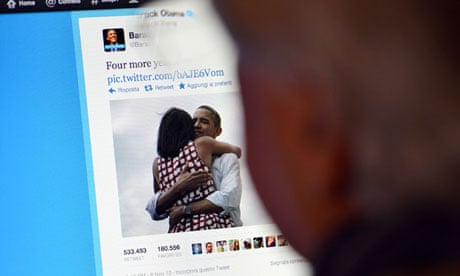The re-election of Barack Obama provoked, perhaps not surprisingly, some racist, offensive and just plain stupid reaction on social media.
But the decision of websites such as Buzzfeed and Jezebel to pick out some of the more egregious examples – many by high school students – has prompted a debate about the ethics of so-called "social media shaming".
A discussion between Buzzfeed's Matthew Buchanan and Read Write's Fruzsina Eördögh came to a head on Monday night when Buchanan posted this piece in defense of the two news blogs:
When people say things out loud that the public has collectively – or like, a lot of it, anyway – agreed are offensive, hurtful, or stupid, it's within the purview of the public to retort, to challenge, and to chasten.
Eördögh sees things differently. She says that since Twitter users are unaware when and where their content is being republished, the ethics of doing so are pretty murky, especially in the cases of minors.
Users have a right to know what is happening with their communication, and they don't have to participate in surveys, research, or even in media articles if they don't want to. Sometimes communication between friends really is just communication between friends. Collecting their data could even be a copyright violation.
This is just the latest in an ongoing discussion about free speech on the internet, one that's often taken place on the Guardian. This time, however, teenagers are involved. On Jezebel, Tracie Egan Morrissey lamented how many of the racist tweets came from high school students: "If you believe the children are our future, then our future is fucked" she wrote. She contacted the principals and superintendents of the students' schools to "find out how calling the president – or any person of color, for that matter – a 'nigger' and a 'monkey' jibes with their student conduct code of ethics".
Did Morrissey go too far? Not according to Buchanan, who says that teenagers need to learn to take responsibility for their actions online. "The internet is real," he wrote. "When you say things on the internet now, they carry real weight and meaning."
What do you think? Is tweeting any different from standing in a public park holding up a sign as TV cameras roll by? Should journalists take extra caution when posting tweets from minors? Or is it up to parents and teachers to teach their children how to behave responsibly online? Tell us your thoughts in the thread below.

Comments (…)
Sign in or create your Guardian account to join the discussion